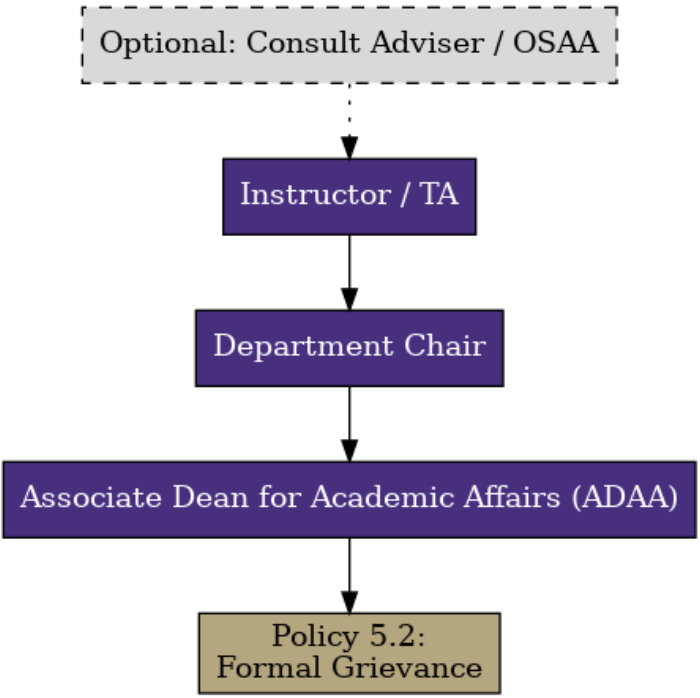Applies to: A/BSN, CIPCT (MS), DNP, Certs, PhD
I. Policy Statement
The School of Nursing (SoN) encourages open, respectful communication regarding instructional concerns. Students, faculty, and staff share responsibility for fostering a supportive learning environment where concerns can be raised, addressed, and resolved in a timely manner.
This policy describes the informal process for addressing concerns related to instruction, such as teaching methods, course organization, learning environment, communication, or assessment practices. Students are encouraged to raise concerns early and through appropriate channels to support constructive resolution. If concerns remain unresolved, students may pursue the formal grievance process outlined in UW School of Nursing Policy 5.2: Student Grievance & Appeals Process.
Concerns related to grading may be raised under this policy. However, formal grade appeals must follow University procedures: SGP 110 https://policy.uw.edu/directory/sgp/sgp-110-grades-honors-and-scholarship/#2-change-of-grade
II. Process
Each step of the informal process should be attempted in order, unless the student has reason not to (e.g., safety, conflict of interest, or bias).
A. Optional Advising Consultation
- Students may begin by consulting their Program Advisor for guidance and support in raising instructional concerns.
- Advisors help students identify appropriate next steps, coach on communication strategies, and connect to resources.
B. Direct Discussion with Faculty or TA
- Students who have concerns about a course, faculty, or teaching assistant (TA) are encouraged to raise them directly with that individual as soon as possible.
- Direct communication is often the most effective way to resolve misunderstandings and clarify expectations.
- Meetings normally occur within 5 business days of the request. If extenuating circumstances prevent meeting within this timeframe (e.g., illness, travel, or clinical schedules), the meeting should occur as soon as reasonably possible.
- Students are encouraged to document the discussion for their own records. Faculty or TAs may also provide a brief written summary of the discussion and outcomes, if appropriate.
C. Department Chair Escalation
- If the student is not comfortable raising the concern with the faculty or TA, or if the concern is not resolved, the student may submit the concern in writing to the Department Chair of the course faculty member’s department.
- To identify the appropriate Department Chair, use the faculty directory to determine the department of the course faculty.
- The Department Chair will review the concern and investigate as appropriate to the situation.
- The Department Chair will provide a written response or summary of outcomes within 10 business days of receiving the concern.
- Students are encouraged to keep their own record of communications.
| Department | Chair Name | Phone | |
|---|---|---|---|
| Biobehavioral Nursing & Health Informatics (BNHI) | Dr. Brenda Zierler | 206.227.8116 | brendaz@uw.edu |
| Child, Family, and Population Health Nursing (CFPHN) | Dr. Pamela Kohler | 206.616.7962 | pkohler2@uw.edu |
D. Escalation to Associate Dean for Student and Academic Affairs
- Within 10 business days, if the concern is not resolved after discussion with the Department Chair, the student may contact the ADAA (sonadaa@uw.edu) for additional review and support.
- The ADAA will review the concern, may meet with the student and/or faculty as appropriate, and may consult with the Department Chair or OSAA staff to facilitate resolution.
- The ADAA will provide a written response or summary of outcomes within 10 business days of receiving the concern.
- Students are encouraged to keep their own record of communications.
E. Formal Grievance if Unresolved
- If concerns remain unresolved after following the above steps, students may pursue the formal grievance and appeals process outlined in UW School of Nursing Policy 5.2.
III. Additional Categories of Concerns
A. Accessibility and Disability-Related Concerns
- If the concern involves accommodations or accessibility, students should contact Disability Resources for Students (DRS).
- DRS partners with students, faculty, and the School of Nursing to ensure accommodations are implemented appropriately.
- Information and support: https://depts.washington.edu/uwdrs/
B. Bias, Discrimination, and Civil Rights Concerns
If the concern relates to diversity, equity, inclusion, bias, discrimination, harassment, or retaliation, students have additional options:
- UW Civil Rights Office (CRO): for formal complaints, resolution processes, and guidance on civil rights protections
- UW Civil Rights & Title IX Reporting Form (anonymous or identified submissions)
- Students may also consult the SoN DEI website for informal guidance.
C. Additional Resources
The UW Office of the Ombud provides confidential, impartial services for preventing, managing, and resolving conflict. Students may consult the Ombud at any point during this informal process.
IV. Flowchart

V. Roles and Responsibilities Summary
| Activity | Student | TA/Instructor | Department Chair | Academic Advisor | ADAA | UW Ombud |
|---|---|---|---|---|---|---|
| Seek advising support | R/A | C | ||||
| Direct discussion with faculty | R/A | R | C (optional) |
C (optional) |
||
| Escalate unresolved concern to Department Chair | R | I | R/A | C (optional) |
C (optional) |
|
| Escalate unresolved concern to ADAA | R | I | I | C (optional) |
A | C (optional) |
| Seek neutral/alternative support | R | I | R | |||
| Pursue formal grievance if concern unresolved | R/A | C (optional) |
I |
RACI Legend:
- R = Responsible: Performs the task
- A = Accountable: Ultimately answerable
- C = Consulted: Provides input
- I = Informed: Kept up to date
Related Policies & References
- UW Presidential Executive Order 81: Prohibiting Discrimination, Harassment, and Sexual Misconduct
- UW Civil Rights Office (CRO)
- UW Civil Rights & Title IX Reporting Form
- UW Employee Reporting Obligations
- UW Disability Resources for Students
- UW Ombud
- School of Nursing DEI Resources
- UW School of Nursing Policy 5.2: Student Grievance & Appeals Process
Last updated: September 2025